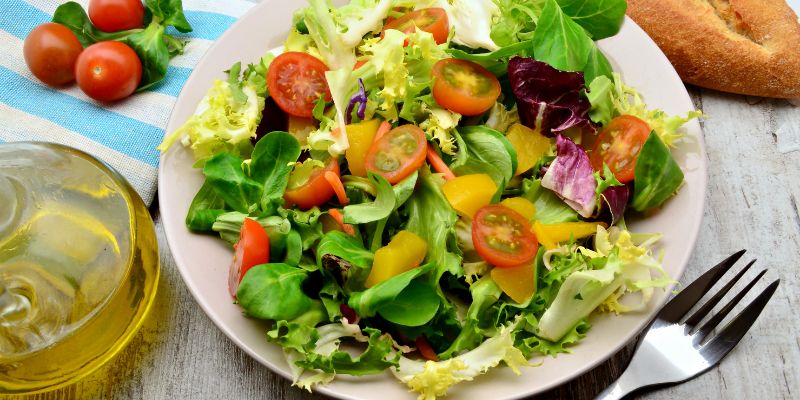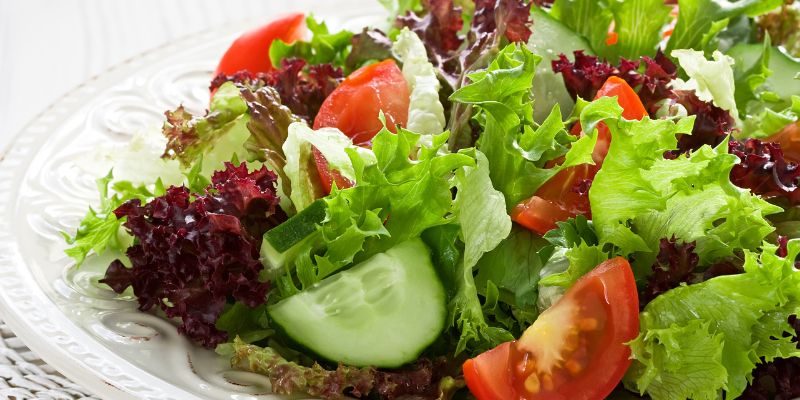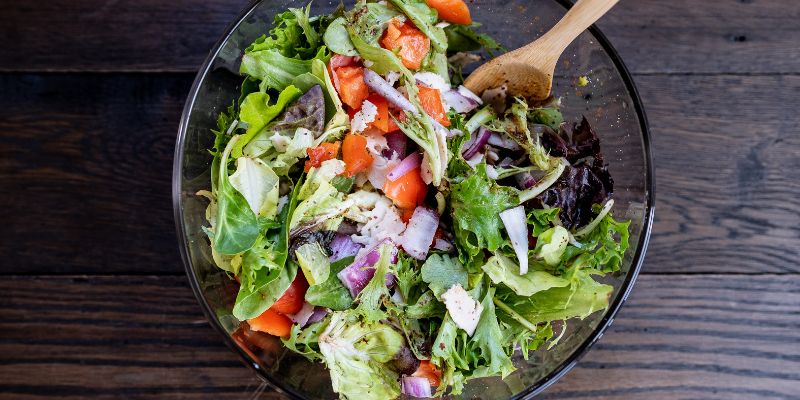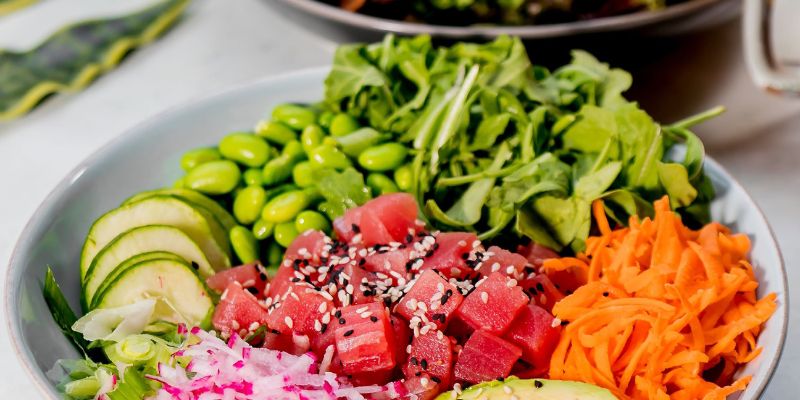Picture this, you’re trying to make healthier choices, so you opt for a refreshing, leafy green salad. But shortly after indulging in your nutritious meal, an uncomfortable sensation starts to brew in your stomach. You might wonder, “Why does salad make my stomach hurt?” Fear not, for you’re not alone in this mystery!
In this article, we’ll embark on a journey into the world of salads and digestion, exploring the fascinating reasons behind those occasional tummy troubles.
The Salad Saga Begins: Fiber Overload
One of the prime suspects in the case of the aching salad stomach is fiber. While fiber is a key component of a balanced diet, consuming too much of it in one sitting can lead to digestive discomfort.
Leafy greens like spinach, kale, and romaine are rich in insoluble fiber, and adds bulk to your stool, and aids in healthy digestion. However, if your digestive system isn’t accustomed to a sudden influx of fiber, it might react with gas, bloating, and cramps.
Tip: To avoid fiber overload, gradually increase your fiber intake and ensure you’re drinking plenty of water to help your digestive system adapt.
Salad Dressing Dilemmas: Fats and Acids
Now, let’s move on to that delightful dressing that enhances the flavors of your salad. Many dressings contain fats and acids, which can sometimes trigger digestive distress. High-fat dressings, while delicious, can slow down digestion, leading to that uneasy feeling. Additionally, acidic ingredients like vinegar or citrus juices might irritate a sensitive stomach, causing discomfort.
Tip: Opt for lighter dressings like vinaigrettes made with olive oil and lemon juice to minimize fat and acidity-related issues.
You’ll Also Like: Jason’s Deli Italian Pasta Salad: 12 Health Benefits
The Raw Reality: Enzymes and Digestion

Have you ever heard of the term “enzymes”? These little helpers play a significant role in breaking down the food you eat, aiding in proper digestion. Raw vegetables, such as those commonly found in salads, contain enzymes that can be a double-edged sword. While these enzymes can be beneficial in breaking down nutrients, they might also cause digestive discomfort, especially if your body lacks the necessary enzymes to efficiently process them.
Tip: Consider lightly cooking certain vegetables to deactivate some of the enzymes and make digestion easier on your stomach.
Gas Matters: Cruciferous Culprits

Ah, the infamous gassy feeling after consuming a salad. If you find yourself dealing with excess gas and bloating, the culprits could be cruciferous vegetables like broccoli, cauliflower, and Brussels sprouts. These veggies contain a type of carbohydrate that can be challenging for some people to digest, leading to the production of gas during digestion.
Tip: Cook cruciferous vegetables before adding them to your salad or try incorporating them in smaller quantities to see if your stomach reacts more favorably.
Sensitivity to FODMAPs: A Hidden Factor
Ever heard of FODMAPs? It stands for Fermentable Oligosaccharides, Disaccharides, Monosaccharides, and Polyols – a group of carbohydrates that some people’s digestive systems struggle to process. Foods high in FODMAPs, including certain vegetables commonly found in salads, can lead to gastrointestinal discomfort, bloating, and gas, particularly in individuals with FODMAP sensitivity.
Tip: If you suspect FODMAP sensitivity, consider working with a healthcare professional to identify trigger foods and chart out a diet that suits your digestive needs.
Beyond the Physical: Mind-Gut Connection
Surprisingly, your emotions and stress levels can also play a role in how your stomach reacts to certain foods, including salads. The mind-gut connection is a complex interplay between your brain and digestive system. Stress and anxiety can lead to changes in gut motility and sensitivity, potentially exacerbating digestive discomfort after a meal.
Tip: Practice relaxation techniques like deep breathing, mindfulness, or yoga to help minimize the impact of stress on your digestive system.
You’ll Also Like: Delectable Delights: Homemade Chicken Salad Chick Cookie Recipe
Salvaging Salad Sensations: Digestive Enzymes Supplements

If you’re a salad enthusiast but often find yourself grappling with digestive discomfort, consider introducing digestive enzyme supplements to your routine. These supplements can aid in the breakdown of complex nutrients, potentially alleviating the stress on your digestive system. Amylase, protease, and lipase are some of the enzymes that help break down carbohydrates, proteins, and fats, respectively.
Tip: Consult a healthcare professional before adding digestive enzyme supplements to your diet, as they can provide personalized recommendations based on your specific digestive needs.
Embracing Probiotics: Gut Health’s Best Friend
The world of gut health is a fascinating one, and it’s closely tied to how your stomach reacts to different foods, including salads. Probiotics, the friendly bacteria that reside in your gut, play a crucial role in maintaining digestive harmony. Introducing probiotic-rich foods or supplements to your diet could help improve the overall balance of your gut microbiota, potentially reducing digestive discomfort.
Tip: Incorporate yogurt, kefir, sauerkraut, kimchi, or other probiotic-rich foods into your meals to support your gut health and enhance your salad experience.
Personalization is Key: Your Salad, Your Way
While the factors mentioned earlier play a significant role in salad-related stomach discomfort, it’s important to remember that everyone’s digestive system is unique. What might cause discomfort for one person might not affect another in the same way. This highlights the importance of personalization when it comes to your salad choices.
Tip: Keep a food journal to track which ingredients and combinations work best for your stomach. This way, you can curate salads that align with your digestive needs while still enjoying a variety of flavors.
You’ll Also Like: How to Make Qdoba Tortilla Soup at Home: A Simple and Delicious Recipe
Our Take
So, why does salad sometimes make your stomach hurt? The answer is a combination of factors, including fiber overload, dressing ingredients, enzymes, gas-inducing vegetables, FODMAPs, and even your emotional state. The key to enjoying salads without the discomfort lies in finding the right balance and understanding your body’s unique needs.
Remember, it’s not about avoiding salads altogether; it’s about making informed choices and being attuned to your body’s signals. By experimenting with cooking methods, portion sizes, and ingredient combinations, you can transform your salad experience into a delightful, tummy-friendly journey towards better health.
So go ahead, embrace the greens, and embark on a delicious adventure armed with the knowledge to keep your stomach healthy and your taste buds happy!
Frequently Asked Questions
- Why do I sometimes get a stomach ache after eating a salad?
Answer: There are several factors at play. Excessive fiber, high-fat dressings, and even raw vegetables can contribute to digestive discomfort. Your body might also react to specific vegetables if you’re sensitive to certain carbohydrates called FODMAPs.
- Can salad dressings be the culprit behind stomach pain?
Answer: Yes, dressings high in fats and acids might slow down digestion and irritate a sensitive stomach, causing discomfort. Opt for lighter dressings to minimize these effects.
- Why do cruciferous vegetables give me gas and bloating?
Answer: Cruciferous vegetables like broccoli and cauliflower contain carbohydrates that are harder to digest, leading to the production of gas during digestion. Cooking them or consuming them in smaller amounts might help.
- How can enzymes in raw vegetables affect digestion?
Answer: Raw vegetables contain enzymes that can aid in nutrient breakdown but might also cause discomfort, especially if your body lacks the necessary enzymes to process them. Lightly cooking certain veggies can help ease digestion.
- What are FODMAPs, and why do they cause stomach issues?
Answer: FODMAPs are carbohydrates that some people’s digestive systems struggle to process. High-FODMAP foods, including certain vegetables, can lead to gastrointestinal discomfort, bloating, and gas, especially in individuals with FODMAP sensitivity.
- Can stress really impact how my stomach reacts to salads?
Answer: Absolutely. Stress and anxiety can affect gut motility and sensitivity, exacerbating digestive discomfort. The mind-gut connection is real, and managing stress can lead to a more comfortable eating experience.
- Are there ways to make salads more stomach-friendly?
Answer: Yes! Gradually increase fiber intake, opt for light dressings, cook or reduce portions of gas-inducing veggies, and consider digestive enzyme supplements or probiotic-rich foods to support digestion.
- Should I avoid salads if they cause discomfort?
Answer: Not necessarily. It’s about finding what works for you. Experiment with ingredients, cooking methods, and portion sizes. You can still enjoy salads while minimizing discomfort.
- Can probiotics really help with stomach issues related to salads?
Answer: Probiotics are beneficial for overall gut health and might aid in reducing digestive discomfort. Foods like yogurt, sauerkraut, and kimchi contain probiotics that can contribute to a healthier gut.
- How can I personalize my salad choices to prevent discomfort?
Answer: Keep a food journal to track how different ingredients affect you. Tailor your salads based on your body’s responses, incorporating elements like digestive enzymes, probiotics, and mindful eating practices.

At Bridge House Tavern, we’re more than a team of food enthusiasts; we’re a culinary journey waiting to be savored. Our five-member crew is on a relentless quest to explore, create, and share the wonders of the gastronomic world.





